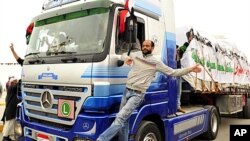U.N. Humanitarian Coordinator for Libya Rashid Khalikov met with Libya's deputy foreign minister and deputy minister of health. The aim of his visit was to negotiate arrangements for a U.N. mission to assess the humanitarian needs.
But he says the Libyan government was not sure the humanitarian situation in the country justified an international needs assessment.
"They did not say no to [an] international presence," said Khalikov. "The government was of the view that there are no humanitarian needs, that the situation is under control, and that the humanitarian requirements are limited to food and medical supplies. And they have plenty of those, according to them. They would not go beyond that, and they would find that a little bit difficult to talk about the impact on civilians and the impact that will make on the social services from the ongoing conflict."
Khalikov says organizing a mission presents a number of difficulties. He says all U.N. personnel need visas to enter the country and before a humanitarian assessment mission can go ahead, the United Nations has to assess the security situation.
The U.N. coordinator was in Libya between March 12 and 16. This was before the joint operation to enforce a U.N.-backed no-fly zone over Libya began. Therefore, he says, he is unable to comment on the effect the international action is having on the civilian population.
However, he says, Libyan authorities took him to the city of Zawiya, about 45 kilometers west of Tripoli. He says the buildings have suffered severe damage, indicating the ferocity of the fighting that had taken place.
"I was told by the government that the situation is back to normal, and they are in full control of the situation in the city, which may be the case. I am not challenging that," added Khalikov. "However, I saw a lot of military equipment and military personnel on the way from Tripoli to Zawiya, which is an indication that the situation is still extremely tense in that place."
Khalikov describes the situation in Libya as very fluid and unpredictable. He says aid agencies have to be prepared for various eventualities. He says getting an international presence inside the country is a top priority.
The U.N. official notes there is no reason to believe the humanitarian requirements in Libya are huge and that a massive intervention is necessary. Nevertheless, he says civilians are suffering, they are needy and the United Nations and other aid agencies should be allowed entry into the country to help them.
Libya: No Need for International Aid
- By Lisa Schlein













